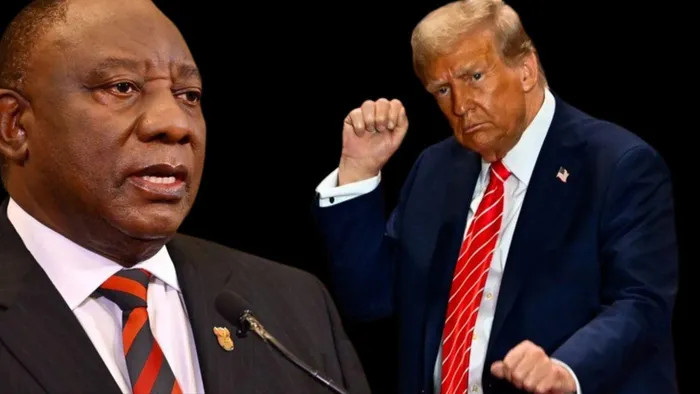What can President Ramaphosa offer the White House in high-stakes US trade talks?
INTERNATIONAL RELATIONS

Diplomatic tensions between Pretoria and Washington could take a positive turn. President Cyril Ramaphosa is expected to meet US President Donald Trump this week to discuss bilateral relations.
Image: SihleMlambo/IOL
By Thabile Nkunjana
On May 14, 2025, the Presidency office declared that President Ramaphosa would be travelling to the US for a working visit from May 19 to May 22. He is joined by John Steenhuisen, Minister of Agriculture; Parks Tau, Minister of Trade, Industry, and Competition; Ronald Lamola, Minister of International Relations and Cooperation; and Khumbudzo Ntshavheni, Minister at the Presidency.
This comes after a string of topics that President Trump and his administration have brought up, including the conflict between Russia and Ukraine, the case against Israel in the International Court of Justice, and most recently, the allegations of "persecution" of white farmers that resulted in the migration of 49 Afrikaners to the United States.
To mend the misinformation about South Africa that has caused misconceptions and to re-establish diplomatic relations between Pretoria and the White House, President Ramaphosa recently called Trump, and he is now heading to the US.
What message about agricultural trade should the president convey at the White House now that he is travelling to the US?
Based on trade data, South Africa is more economically dependent on the US than the US is on South Africa. For instance, in 2024, South Africa's total exports to the world were worth R2 trillion, with the U.S. accounting for R150.0 billion or 7%, the second-largest market after China. However, according to trade map data, South Africa only contributed 0.3% or R106.5bn of the R37.8trln in US exports to the world.
Regarding the agricultural industry, South Africa exported R9.8bn worth of agricultural products to the US in 2024, a marginal increase from R9.1bn in2023. This amounts to 4% of the country's overall agricultural exports in 2024.
This increase complements South Africa's agribusiness endeavours to broaden its global reach, including the US market, and create jobs, thereby supporting the country's job profile in the sector, transforming the economy, and contributing to the overall NDP 2030 strategy.
Targeting the US market, the agriculture sector has spent billions of rand on infrastructure, research and others. Many South African farmers would have severe financial setbacks and employment losses, and export revenue would be seriously threatened in the medium-to short-term operations, if trade relations between the two countries deteriorate further.
With many young and emerging orchards aimed at the US market, Western Cape farmers have contributed to a discernible increase in the amount of land under citrus cultivation in the province over the years. These investments go beyond trade, which is the focus of most of the analyses done to estimate the possible effects on South Africa of losing AGOA.
In terms of commodities, exports, and job creation, the Western Cape will be severely impacted at the provincial level if AGOA is terminated or if tariffs are raised by almost 30% after July 10.
For example, the Western Cape was responsible for 55% of agricultural exports to the US in 2022, with Mpumalanga (15%), Gauteng (10%), Eastern Cape (7%), and KZN (6%), following closely behind.
As of 2024, the Western Cape is once again by far the greatest employer in the agricultural sector and the largest AGOA beneficiary from the agricultural sector in South Africa. With KwaZulu Natal, Mpumalanga, the Eastern Cape, the Northen Cape, and Limpopo all having many rural areas that would be affected negatively by any changes in trade with the US should things go south, the Western Cape comfortably accounts for roughly 20% of jobs within the agricultural sector in the country.
A select few products dominated the US market, despite South Africa exporting hundreds of agricultural products to the rest of the world. Oranges, Mandarins, macadamia nuts, wine, ice cream, sugar, dried grapes, apple juice, peaches, and grapefruit juice were among them.
The reality is that President Ramaphosa and his delegation are not travelling to the US on a clean slate. But from a political perspective, he has the expertise and experience to do so, and he has clearly stated the country's neutrality on several international geopolitical developments that are probably going to come up in the discussions. He is likely to have to deal with this before discussing trade and economic matters.
South Africa might need to make a proposal after Qatar, the United Arab Emirates, and the United Kingdom made some significant promises to the US about trade and investment in recent days.
Trump has stated unequivocally that he wants trade with countries that trade with the US to be reciprocal. As a result, the delegation to the US ought to get ready to compromise on trade.
The US will probably demand that some of its agricultural products be imported into South Africa, as the agricultural sector has benefited noticeable from AGOA. This will be challenging due to phytosanitary regulations that have been a problem, particularly for livestock or animal products.
If all regulatory requirements are fulfilled, compromises can be made for certain products, particularly those that are counter seasonal. Additionally, South African farmers do not receive the same level of support as American farmers, which has ramifications for the entire sector.
Tariffs are likely the lower hanging fruit. Depending on the product, US farmers currently face tariffs in South Africa ranging from 0% to 17%. The President might perhaps be able to accommodate Trump's trade demands by lowering these tariffs to about 10%.

Mr Thabile Nkunjana is a senior economist under the Trade Research Unit at the National Agricultural Marketing Council
Image: LinkedIn
* Thabile Nkunjana is a senior economist under the Trade Research Unit at the National Agricultural Marketing Council.
** He writes on his personal capacity, and does not, necessarily express views of IOL or Independent Media.
Visit: www.businessreport.co.za